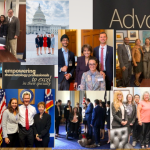She also emphasized that advocacy work is not partisan politics—the focus is on the issues, not political ideology. “The job of the advocate is to help our representatives understand the issues we are facing in our offices and the issues our patients are facing,” she says.
Another benefit for fellows? Completing the course fulfills the “Systems-Based Practice” section of their fellowship.
2018 Advocacy Efforts
According to Dr. Worthing, potential issues that may be addressed at this year’s event include the increasing medical specialty workforce shortage and the Trump Administration’s proposals to lower drug prices by changing how patients obtain their medications.
It is hoped that strong advocacy efforts on these issues will mirror prior efforts that, for example, succeeded in preventing implementation of the proposed drastic cuts to the Medicare Part B infusion drug system and eliminated arbitrary caps on Medicare outpatient therapies.
But to succeed, members need to get involved. “There’s nothing as impactful as having a group of patients, doctors and rheumatology professionals in a lawmaker’s office talking about every facet of rheumatology care and the challenges that must be fixed,” Dr. Worthing says.
For members who cannot participate this year, he encourages them to get involved by visiting the ACR’s Legislative Action Center.
The application period for both events opens July 5. Online application will be available for any member who wants to participate in the Advocates for Arthritis fly-In event. Fellows and program directors will be receiving an email inviting them to apply for the Advocacy 101 program.
Mary Beth Nierengarten is a freelance medical journalist based in Minneapolis.


